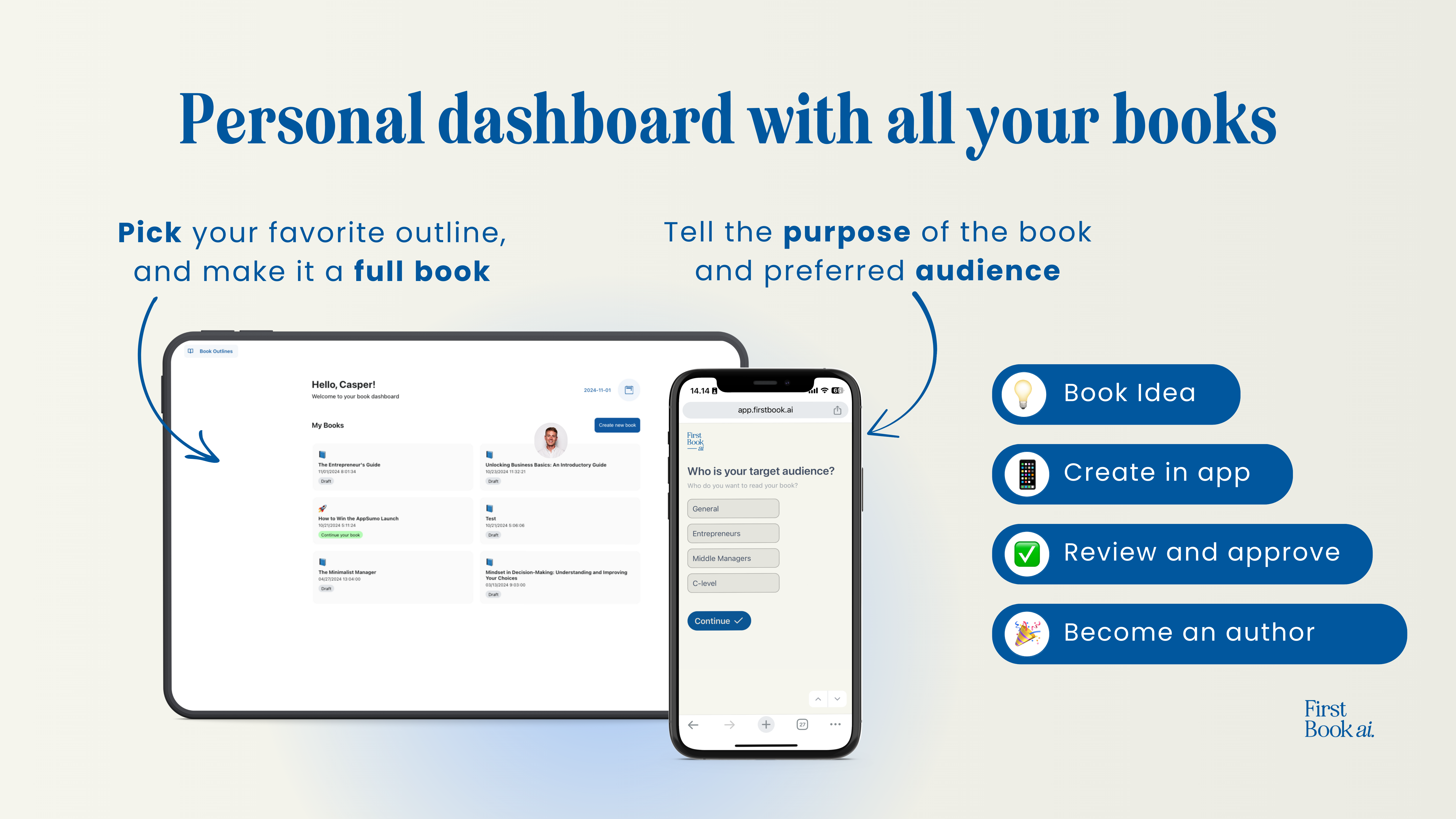When Casper Brix co-founded Firstbook.ai in February 2024, it wasn’t with the ambition to revolutionize publishing. It started with a simple question: Why does writing a book have to be so hard?
Today, Firstbook.ai helps individuals and companies generate full-length, high-quality books using artificial intelligence – and it’s now partnering with Aimie to help small businesses turn AI curiosity into concrete results.
“After publishing my first book, I had so many people asking how I found the time to write it,” Casper explains. “The truth is, it was a passion project, but the process was incredibly manual and slow. That’s when I started wondering: could we make this easier using AI?”
From passion project to publishing platform
Casper’s journey with Firstbook.ai began not in a lab, but in a living room – collaborating with a friend and co-founder Lucas, mapping out how they could support others in publishing their ideas faster. Their platform now allows users to go from outline to full manuscript in hours.
“What sets us apart,” he says, “is that we don’t just give you a tool – we give you a finished product. A real book. Some people use it for personal publishing, but what surprised us was how many businesses started using it too.”
Companies use Firstbook.ai to create branded books, thought leadership content, and even personalized B2B sales tools. “We’ve seen companies create books as hyper-personalized lead magnets – not just a whitepaper, but an entire book tailored to a specific client or niche,” Casper says.
Why the U.S. came first – and what’s changing in Europe
While Firstbook.ai is based in Denmark, the team made a deliberate choice to launch in the U.S. market first. According to Casper, it wasn’t just about market size – it was about mindset.
“Some parts of the U.S. are just a couple of years ahead when it comes to AI maturity,” he explains. “Over there, people are less afraid of it. They’re curious. They want to try things. In Denmark, AI still feels like a buzzword to a lot of people. They’ve heard of ChatGPT – but they’re not always sure what else is out there, or what it actually means for their business.”
He adds that part of Firstbook.ai’s mission, and Aimie’s, is to break down that hesitation and help more people feel empowered, not intimidated.
“It’s not magic. It’s just about saving time and working smarter. That’s the story we want to tell.”
A shift in who gets to publish
Traditionally, publishing was a gate-kept industry. But as AI democratizes tools like writing, design, and automation, more people can create professional content at scale.
“Only a few percent of aspiring authors ever get published,” Casper notes. “We want to empower the remaining 95%.”
Firstbook.ai is particularly focused on the U.S. market for now – “It’s just more mature when it comes to AI,” Casper explains – but their partnership with Aimie marks a step toward broader accessibility.
“I love that Aimie is about removing the mystery around AI. People hear the term and think, ‘This is scary,’ but it’s not. AI should be something that makes your workday easier, not more complicated.”

Advice for small businesses: start small, think smart
Casper is clear on where small businesses should begin:
Identify your repetitive tasks. “Anything you do three times a week, there’s probably a tool that can automate it. Even if it’s just an email draft, you could be saving hours.”
Use AI to scale your marketing. “You don’t need a full team. With the right setup, one person can run content across LinkedIn, Instagram, and more in just a few hours a week.”
Don’t try to do everything at once. “I’m not saying you have to do everything at once. Just start with a few small hacks that make your day easier, and build from there.”
The future of AI – and the future of work
Casper sees a near future where everyone becomes more autonomous in their work. “I think we’ll all be working for ourselves, in some way. AI will just help us do more, faster, and with fewer blockers.”
It’s a mindset shift Aimie and Firstbook.ai both aim to support. As Casper says: “This isn’t a phase. This is the future. And if we can help more people understand that AI is a tool, not a threat, we’re doing something right.”
 Aimie
Aimie